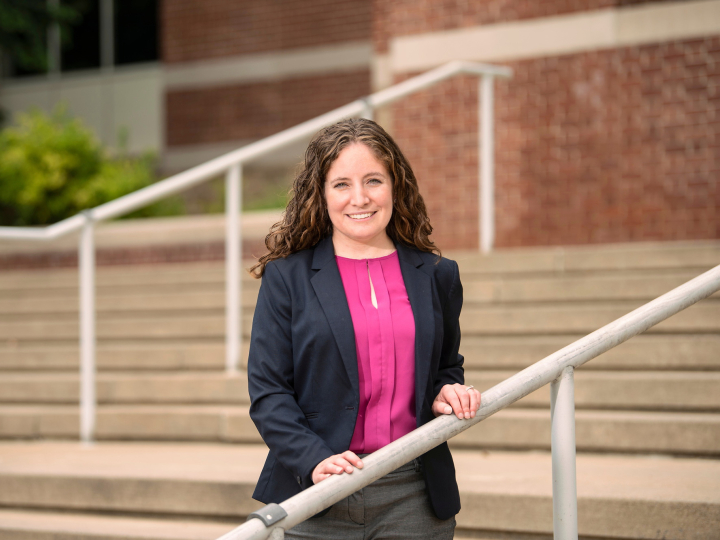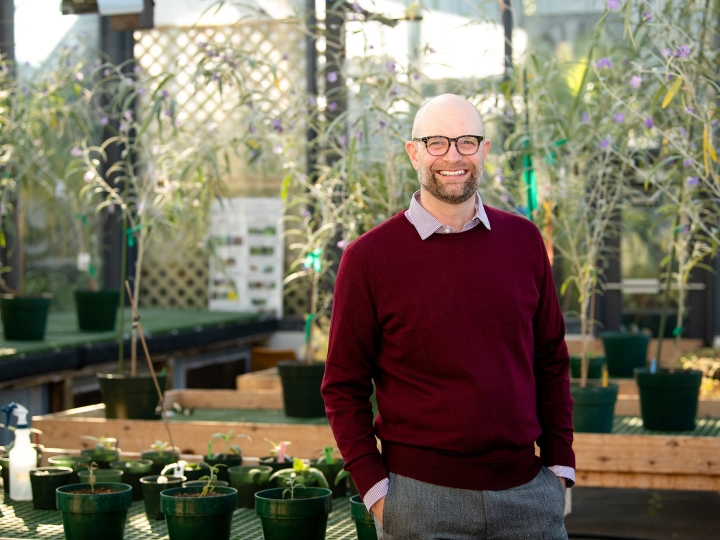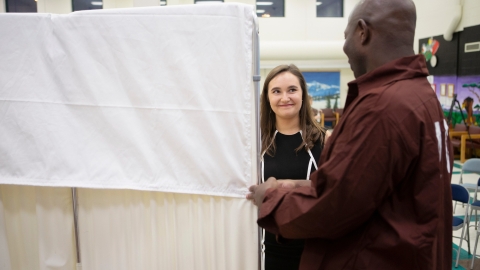
Bucknell Students Stage Innovative Production of ‘Twelve Angry Men’ Inside Prison
December 16, 2019
Mackenzie Gross '21 talks to an inside student and cast member at SCI Coal Township before the performance begins. Photo by Dustin Fenstermacher
It takes a bold, visionary mind to reimagine a 65-year-old staple of eighth grade English class in a way nobody has tried before.
It takes someone like Mackenzie Gross '21.
The theatre and comparative humanities double-major from Poolesville, Md., directed a first-of-its-kind staging of Twelve Angry Men inside SCI Coal Township, a prison located about 45 minutes southeast of Bucknell.
The 12 jurors were played by six female Bucknell students and six "inside students" — men who are prisoners at SCI Coal Township.
"Twelve Angry Men is a play that I've known for a very long time, but I thought it would be remarkable to have it spoken by prisoners," Gross says. "When you have a murder trial being performed by individuals who may have committed murder or may have been involved in a crime in some way, it changes the dialogue and gives the words more impact."
Each week throughout the fall semester, the 12 cast members, along with eight other Bucknell students who served as the backstage crew, gathered at the prison to rehearse the play and — just as important — discuss the significance of a piece published before any of them was born.
"We talked about what it means to have words that were written for white men in the '50s to be said by black men and white women," Gross says. "We take these conversations very seriously because we all come from different backgrounds and perspectives."
But long before the makeshift curtain (infirmary sheets draped over folded-up tables on wheels) parted on opening night, Gross had to get buy-in from three important constituents: her professor, the head of the prison and the inmates themselves.
‘Shock and Delight’
The performance was at the end of the fall semester, but Gross' journey began a semester earlier in a Bucknell class called Sociology 239: Deviance and Identity, taught by Professor Carl Milofsky.
In that class, students traveled to SCI Coal Township every other week to talk with the prisoners, who were eligible for the program because they hadn't gotten in trouble while incarcerated. There, Gross met some of the men who would later take center stage.
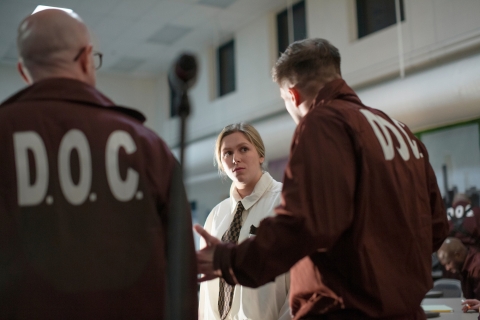
Emma Jaeger '21, a political science major who portrayed Juror No. 10, reacts to Juror No. 3 and Juror No. 4. Photo by Dustin Fenstermacher
"I was thinking, wow, what an amazing opportunity it would be to tell these men's stories," Gross says. "These men are more than a mistake that they made, however many years ago. They are individuals. They have personalities like everyone and anyone."
Gross didn't want her journey to end when the spring semester was over, so she devised a plan and presented it to Milofsky: What about a fall class at the prison where the syllabus was shaped around a semester-ending performance of a classic play about the judicial system?
To Gross' "absolute shock and delight," Milofsky said yes. When they got to the prison later that day, Milofsky gathered the inside students and said, "Mackenzie has something to say."
She asked the men if they would be interested, knowing that if they said no, she wouldn't push.
"The point is to give them a voice. And if that's not the path that interests them, there's really no point," Gross says. "Before I finished asking, one of the inside students put his hand up and said, 'Mack, I gotcha. I'm in.' Before I finished talking, every person in the room had their hand up."
Milofsky entrusted Gross to teach the class with him. Gross wrote the syllabus and a weekly rundown of goals for each week: how many scenes they'd need to block, when the actors needed to be off script, when read-throughs would happen.
As the play was coming together, students — both inside and outside — would approach Milofsky with questions. He'd always respond the same way: "You can't ask me that. That's for Mackenzie."
"I've never met another professor like him that would hand you a class and say, 'It's truly yours,'" Gross says. "The fact that at Bucknell, an undergraduate student can co-teach a class and direct a play at a prison and not be laughed at, is just the most incredible thing to me. It is so humbling, as an undergraduate and especially as a junior."
‘More Than a Number’
It's no understatement to call Gross' staging of Twelve Angry Men a once-in-a-lifetime event. Only one performance, on a Monday night in November, was open to people outside the prison. (A second performance for the prisoners was held two days later.)
It was the first time in the prison's history that a play had been performed inside.
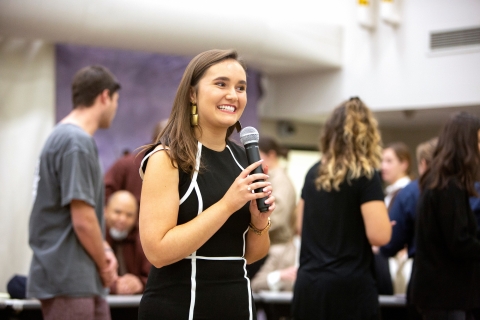
Mackenzie Gross '21 spoke to the crowd after the performance, thanking them for their support of the show. Photo by Dustin Fenstermacher
Gross said that wouldn't have happened without the support of SCI Coal Township Superintendent Tom McGinley. While Gross believes some prisons in America are "oppressive institutions," she's grateful McGinley's prison supports the arts "as a way of rekindling a sort of human self-expression."
Gross was unflinching in her desire to make the play a meaningful experience for the inside students. She scheduled time before and after rehearsals for everyone to discuss the play's significance. She cast the inside students in all of the lead roles. And she helped the prisoners separate the characters from themselves.
"I hope they gained a sense of self-confidence," Gross says. "I hope that we were able to remind them that they are more than a number."
After the performance, the cast took turns telling the audience about their journey from script to stage. One prisoner, who played Juror No. 3, said he was so determined to perfect his performance that he read the play more than 200 times.
From talking to the men, Gross understands the source of that passion.
"They said, 'This is the one thing that I can look forward to every day. This takes me away from thinking about the next 30 years of my life, 60 years of my life,'" Gross says. "For two-and-a-half months, this was a safe space where they could be themselves and they were respected and their opinions were cared about."
Gross says "the stars aligned" when her Bucknell professor, the prison superintendent and the prisoners themselves trusted her to lead. But she's reluctant to take all the credit.
"This cast deserves to be so proud, because they made history," she says. "They made an impact on so many people's lives that will never be forgotten. I'm just glad to have been a part of it."
